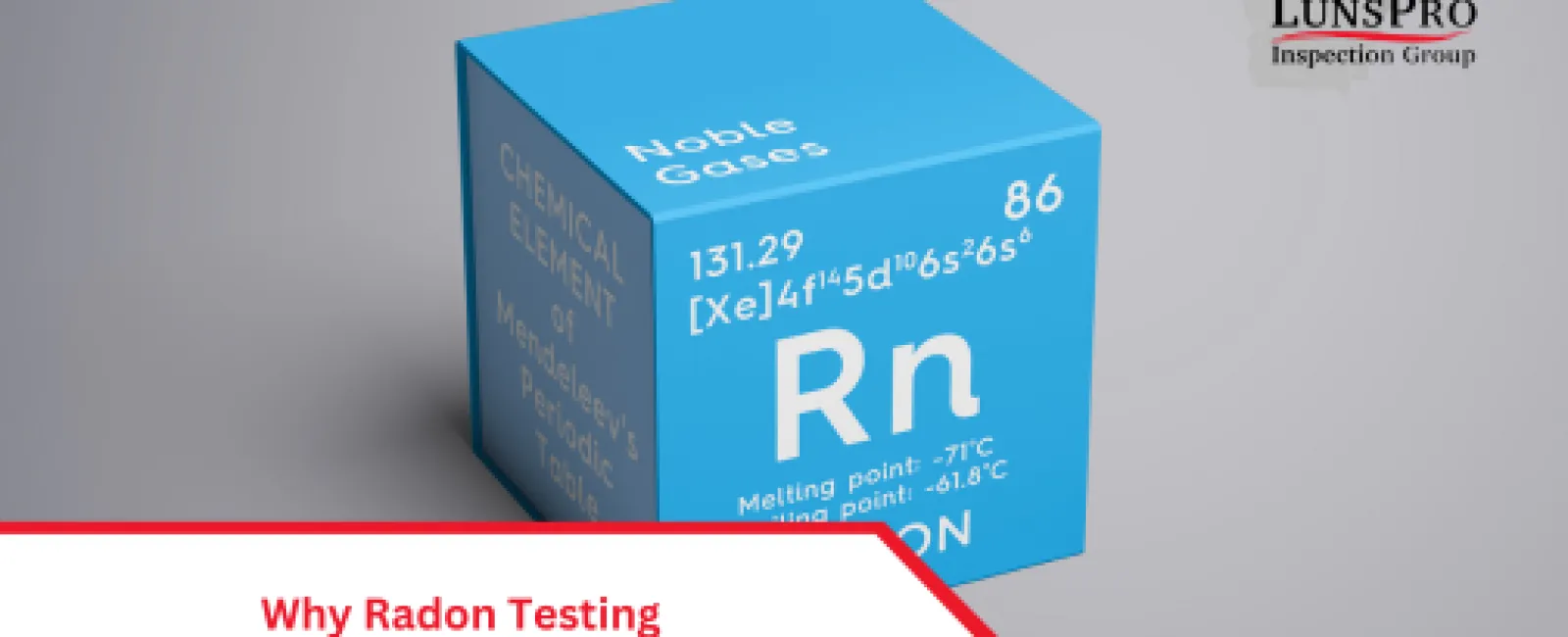Radon is one of the most serious and overlooked threats to homes in Georgia. This invisible, odorless, and tasteless gas seeps into houses from the ground below—and when it goes undetected, it can cause serious health problems, including lung cancer. Despite the known dangers, many Georgia homeowners assume radon testing is only necessary during a real estate transaction or in colder states. In reality, radon doesn't follow a schedule or a map—and its risks are just as relevant in Atlanta, Alpharetta, and Athens as anywhere else in the country.
At LunsPro Inspection Group, we know firsthand how unpredictable and hazardous radon exposure can be. Our Georgia home inspections often reveal elevated radon levels in homes that appeared problem-free. This article will break down what radon is, why it's a year-round concern in Georgia, how it affects homes and health, and what you can do to protect your property and family.
What Is Radon and Why Should Georgia Homeowners Be Concerned?
Radon is a radioactive gas produced by the natural decay of uranium in soil, rock, and water. It rises from the ground and can enter homes through cracks in the foundation, construction joints, sump pumps, and other openings. Because it's completely undetectable without proper testing, radon is often referred to as a "silent killer."
Georgia has moderate to high radon potential, particularly in the northern half of the state. Granite-rich soil and humid conditions allow radon to move upward and accumulate indoors—especially in basements, crawl spaces, and lower levels of homes. Over time, long-term exposure to radon can lead to a higher risk of lung cancer, particularly for smokers.
Georgia Counties with Higher Radon Levels
Radon risk in Georgia varies widely by location, but many homes in counties across metro Atlanta, North Georgia, and parts of Middle Georgia test above the EPA's recommended action level of 4.0 picocuries per liter (pCi/L). Homes in and around:
-
Atlanta
-
Alpharetta
-
Athens
-
Cobb County
-
Gwinnett County
-
Hall County
...are especially vulnerable due to the region's geology and soil composition. Yet even homes in low-risk zones can test above safe limits, especially if there are ventilation issues or foundation cracks.
Why Radon Testing Is Important Year-Round
Many homeowners assume that one radon test is enough—but that's rarely the case. Radon levels fluctuate due to weather, moisture, HVAC usage, and even remodeling. Here's why testing throughout the year is essential:
1. Seasonal Shifts
In the winter, windows stay closed and heating systems run longer, creating negative pressure that draws more radon in. In the summer, shifting moisture and soil conditions can increase radon flow into the home. These seasonal factors cause radon levels to rise and fall significantly—sometimes above the action level during only part of the year.
2. Home Modifications
Any major renovation—especially basement remodeling, sealing, or installing new HVAC systems—can alter airflow patterns and lead to increased radon accumulation. Even seemingly minor changes can impact your exposure risk.
3. Foundation Settling
Over time, all homes settle. This natural movement can open new cracks in foundations or shift existing gaps, creating additional entry points for radon gas.
At LunsPro Inspection Group, our experience shows that Atlanta, Alpharetta, and Athens Residential and Commercial Inspections often uncover changes in radon levels after construction or weather events, proving the need for year-round vigilance.
How Radon Enters and Accumulates in Homes
Radon gas enters homes through:
-
Cracks in concrete slabs or foundations
-
Openings around pipes or wires
-
Sump pump pits
-
Crawl spaces with exposed dirt
-
Floor-wall joints in basements
Once inside, radon can accumulate to unsafe levels—particularly in well-insulated or airtight homes where ventilation is limited. Many Georgia homes, particularly in newer neighborhoods around Alpharetta and Atlanta, fall into this category.
Health Risks Associated with Radon Exposure
The most significant risk from radon is lung cancer. In fact, radon is the second leading cause of lung cancer in the United States, according to the Environmental Protection Agency (EPA). The danger increases substantially for individuals who smoke or have respiratory conditions.
Here's what long-term exposure can cause:
-
Chronic coughing
-
Shortness of breath
-
Chest pain
-
Respiratory complications
-
Lung cancer—even in non-smokers
Because symptoms typically don't appear until the damage is done, the only reliable protection is regular testing and mitigation.
Testing Options for Georgia Homeowners
There are two primary types of radon tests:
Short-Term Testing
-
Measures radon over 2 to 7 days
-
Ideal for quick results
-
Best conducted under closed-house conditions (limited ventilation)
-
Often used during real estate transactions
Long-Term Testing
-
Measures radon levels over 90 days to 1 year
-
Offers a more accurate picture of year-round exposure
-
Accounts for seasonal and weather-related variations
We always recommend long-term testing for homeowners planning to stay in their home, and short-term tests for pre-sale inspections. Both are part of our standard services at LunsPro Inspection Group, offered during Georgia home inspections to provide a comprehensive assessment of a home's safety.
What to Do If Your Radon Levels Are High
If your radon test results come back at 4.0 pCi/L or higher, the EPA recommends mitigation. Here's how it works:
-
Radon mitigation systems use vent pipes and fans to draw radon gas from below the home and release it safely outside
-
Cracks and openings in the foundation are sealed
-
Ventilation systems may be upgraded in basements or crawl spaces
Radon in Commercial Properties
Radon is not just a residential issue. Commercial spaces—including schools, offices, and industrial buildings—are also at risk, especially if they have basements, slab-on-grade construction, or minimal ventilation.
Our Atlanta, Alpharetta, and Athens Residential and Commercial Inspections include radon evaluations to ensure business owners, employees, and customers are safe. Radon problems can lead to liability risks and even legal issues if not properly managed in commercial real estate.
Why Work With LunsPro Inspection Group
At LunsPro Inspection Group, we combine advanced tools, regional expertise, and professional certifications to deliver accurate, timely, and actionable radon testing. We've inspected thousands of homes and commercial buildings across Georgia and understand the specific conditions that lead to elevated radon levels in this region.
What sets us apart:
-
EPA-approved testing equipment
-
Clear, detailed reporting with expert recommendations
-
Support for mitigation planning
-
Integration of radon testing into broader Georgia home inspections for full property insight
Whether you're purchasing a new home in Atlanta or managing an older property in Athens, our inspections give you the data you need to make informed decisions.
Radon is a real and persistent threat in Georgia—but it's one that's easy to overlook. Because it's invisible and odorless, many homeowners assume they're safe. The truth is, only testing can confirm whether your home or building is at risk. And because radon levels fluctuate with seasons, weather, and structural changes, year-round awareness is key.
LunsPro Inspection Group is proud to serve homeowners and business owners across the state with reliable, accurate, and professional radon testing. Our Atlanta, Alpharetta, and Athens Residential and Commercial Inspections are designed to protect your health, your investment, and your peace of mind. Don't wait until it's too late—schedule your radon test today and take the first step toward a safer home.

